Maggots consume decayed organic matter. Maggots can contain pathogenic species. Maggots can spread diseases such as typhoid, cholera, and parasitic worms to humans.
Eaten maggots can cause a number of diseases in cats!
If Myaiasis is suspected, medical treatment from a veterinarian is needed. Check to see if the maggots are emerging from the cat.
If your cat consumes food with maggots, it may become infected with the disease for which the maggot is a vector. There’s even the possibility that nothing will happen.
It is advisable that you keep your cat safe from maggots and keep the place where your cat is clean. If your cat ate some maggots, keep an eye out for changes in behavior or diarrhea.
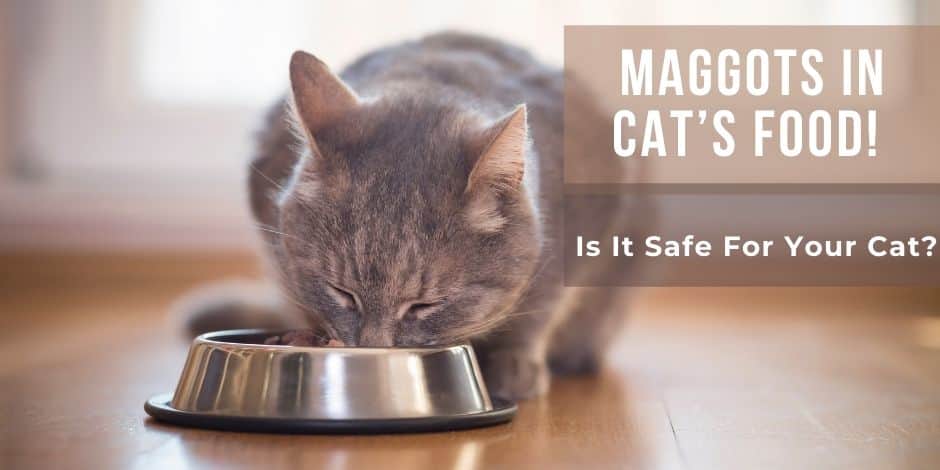

Give Your Cat the Perfect Day
Get the Free Ebook!
Maggots And Cat: Basics To Know
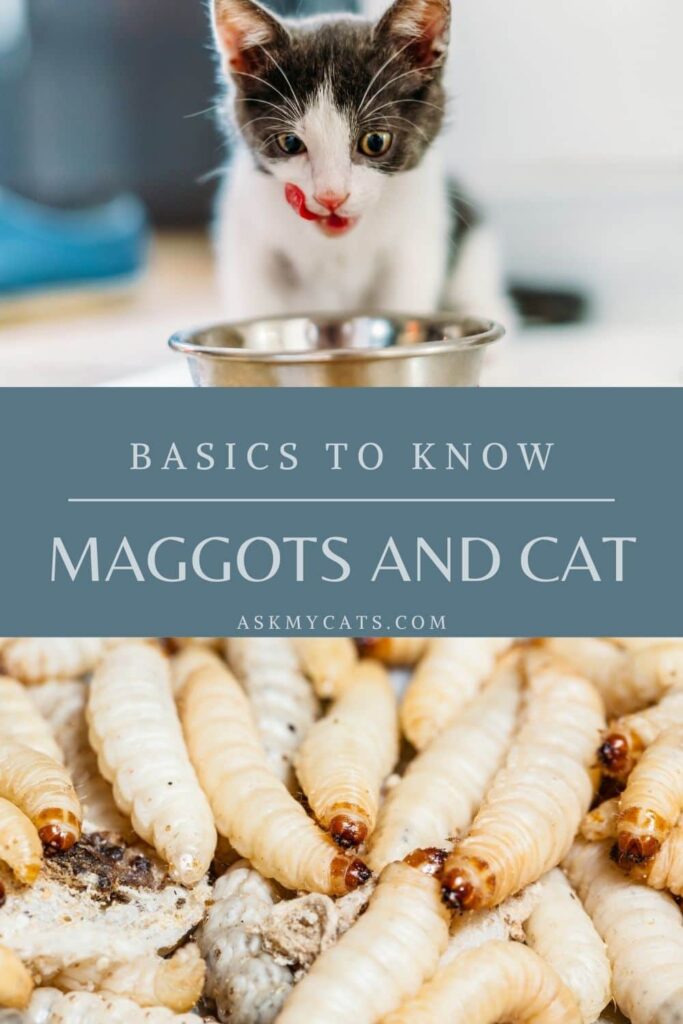
Maggots in cat foods are a seasonal phenomenon that impacts cats during the summer months when adult flies are present.
Myiasis in cats is marked by swollen, raised sores on the skin that are infested with maggots.
The maggots are drawn to damp and inflamed skin caused by draining cuts, skin lesions, fecal-soaked fur coats, as well as necrotic tissue.
Cats with long fur coats are often infected, and the infection will go undetected for a long time because the tiny maggots are difficult to see through the long hair.
Urinary incontinence in cats, baby puppies, and battling Toms are all at risk for developing myiasis.
A maggot is a white worm-like fly larva that is small and tubular. A fly is a small winged insect that feeds on blood, sweat, and mucus as an adult.
There are approximately 34 species of flies in North America, but only flesh flies, bottle flies, blow flies, and the average house fly can cause true maggot infection.
The word “fly attack” or “myiasis” is used by veterinarians to describe a maggot infection.
A maggot feeds on every mammal’s necrotic, or dead, tissue, such as that found in an open wound. The female fly would be drawn to bitten cats or newborn kittens with healed umbilical cord stubs.
The bred female will lay her eggs in the skin’s opening, and the eggs will hatch in three days and begin feasting on the dying flesh of the feline in a matter of weeks.
The maggot’s saliva contains a special enzyme that helps it to enter the skin and induce a bacterial skin infection in the cat.
What Happens If A Cat Eats Maggots: Risks Of Eating Maggots In Food For Cat
The larva of the common fly is known as a maggot. Maggots resemble worms because they have fluffy bodies and no muscles. Their heads are typically smaller and can retract into the body.
Maggots are larvae that feed on the rotting flesh or tissue waste of animals and plants. Good animal tissue and live plant matter are consumed by certain animals.
It’s also possible to eat maggots by chance since they’re commonly found near food, but they’re typically found near tainted food that you can avoid for cats.
However, there are a few drawbacks of eating maggots that you should be mindful of.
It may be safe to consume maggots themselves, but you may be susceptible to whatever they’ve eaten or been exposed to, such as feces or rotting flesh.
Fruit infested with maggots is likely to be rotting and ridden with bacteria. Other risks include the following:
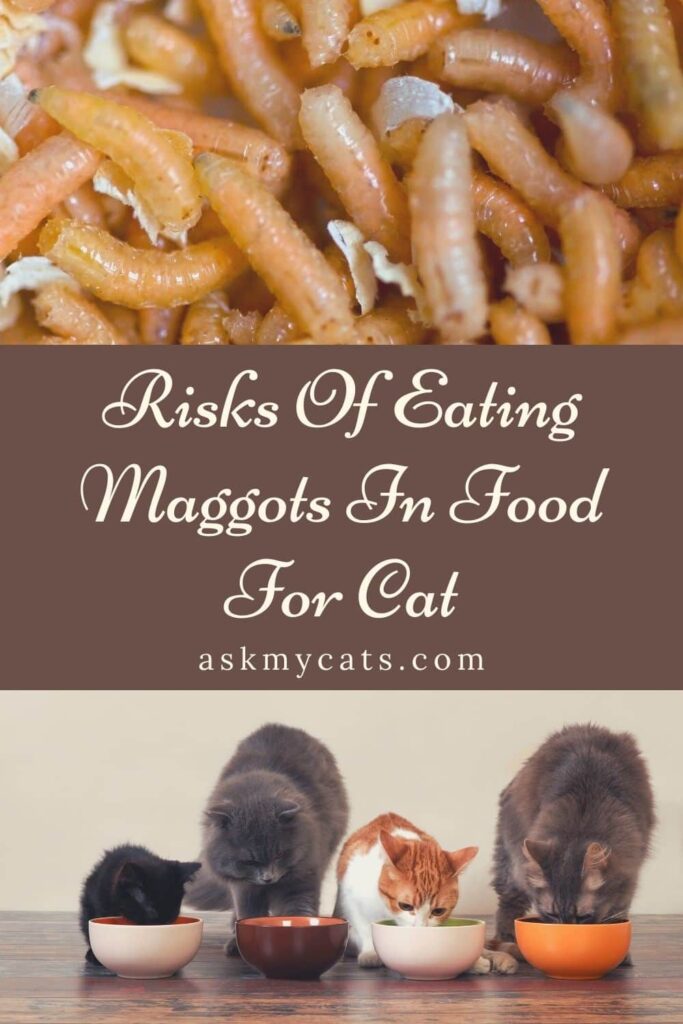
1. Myiasis
Myiasis is a bacterial parasite caused by maggots infesting and feeding on the living tissue of animals or humans. Tropical and subtropical countries are the most affected.
People who have a hard time keeping their teeth clean are particularly vulnerable. Larvae can settle in areas of the mouth that have poor hygiene.
Myiasis can occur in dogs, cats, rabbits, and livestock like lambs and cows. It can also happen to human beings, though not as common.
Fly-strike is frequently observed during the hot humid summer months, making this a prime time to be aware.
While myiasis is most generally found under the skin, swallowing maggots is thought to make internal organs and tissue vulnerable to the larvae.
Myiasis is caused by maggots that can reside in the liver, intestines, and teeth. This will result in severe tissue injury which necessitates medical assistance.
Myiasis is not an infectious illness. Stomach upset, vomiting and diarrhea are all signs of myiasis in the gastrointestinal tract. The larvae are normally visible in the mouth.
2. Bacterial Toxicity
Bacterial poisoning can be caused by consuming maggots or maggot-infested food. Most maggot-infested foods are hazardous to ingest, particularly if the larvae have come into contact with feces.
Animal and human feces are used by certain houseflies as breeding grounds. Garbage or decaying organic matter is also a healthy source of food for them.
Salmonella enteritidis and Escherichia coli bacteria are also capable of infecting maggots. Fever, diarrhea, nausea or vomiting, and cramping are all signs of an E. coli infection.
Salmonella signs are similar to those of E. coli. Both conditions may result in bloody stools and exhaustion. Thus, it may lead to maggots in cat food.
3. Disastrous Allergies
Maggots can cause allergic reactions in some cats. People who treated such types of larvae for use as live fishing bait or who are occupationally exposed have reported respiratory and asthmatic symptoms in their cats.
There have also been cases of touch dermatitis.
It’s been proposed that consuming larvae that have been exposed to or eaten foods you’re allergic to could induce an allergic reaction. To explain this perspective, further science analysis is needed.
Intake Of Maggots By Cat- Safe Or Not?
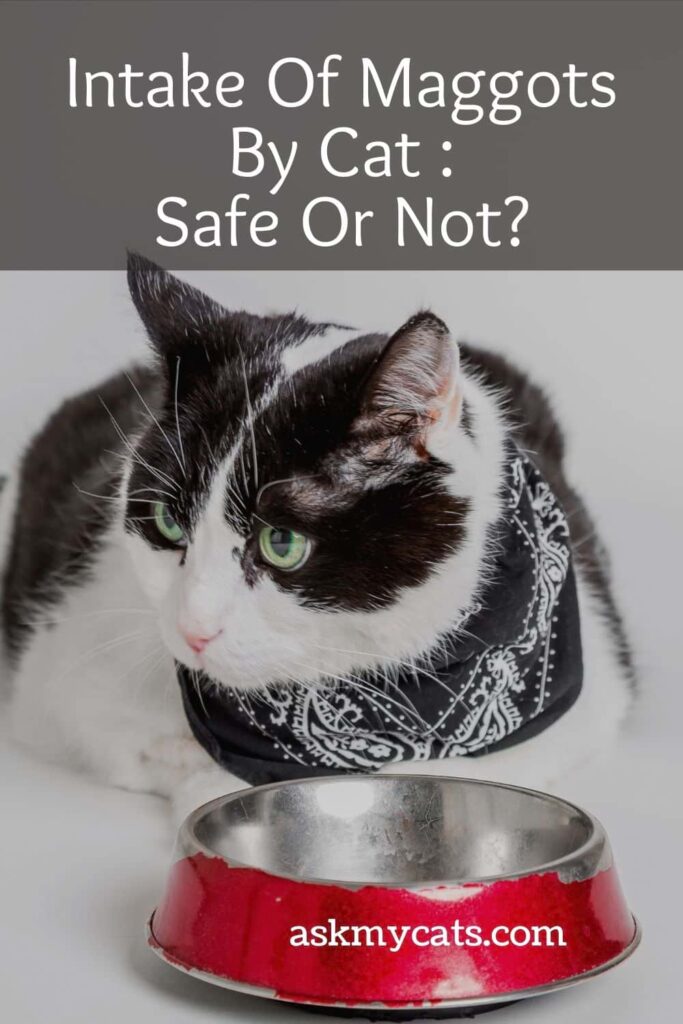
Maggots may be a decent source of protein, healthy fats, and trace minerals.
Scientists are researching the prospect of creating textured protein or a sustainable snack for humans using maggots.
It is better to ingest roasted, fried, or powdered maggots rather than whole, unprocessed larvae.
Microbes, parasites, and bacterial spores will be removed during the processing.
The environmental effect of producing larvae in this manner will be less than that of producing meat for human consumption.
However, risks also remain and are expected to overshadow possible advantages at this time.
My Cat Ate Maggots: What Do I Do | Precautions To Be Taken
If you notice any unpleasant signs in your cat that you suspect are linked to eating maggots, call your vet right up.
This is particularly important if you’re traveling in the tropics or in a country where the food is unhealthy.
Overall, you’re unlikely to come into touch with a significant number of maggots. Your cat will actually be safe if your cat mistakenly eats one in an apple.
Your cat may have the luxury of eating fried maggots or casu marzu at your leisure.
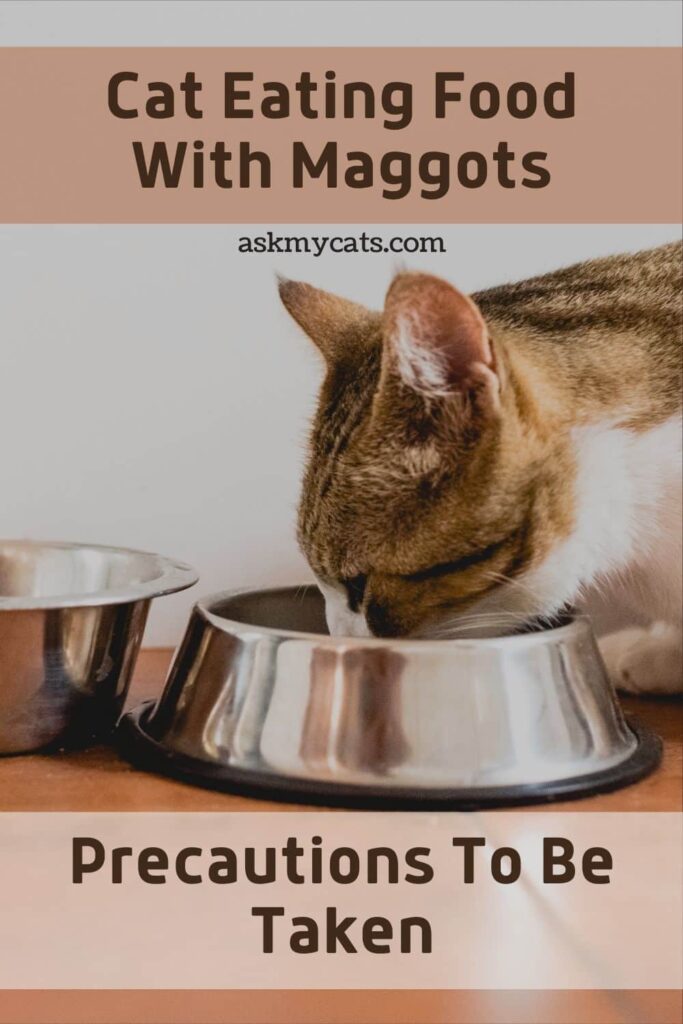
Follow these instructions to keep maggots and flies away from your home:
- Maintain a sanitary condition in your home and kitchen.
- Ensure that none of your fruits, vegetables, or meats becomes breeding grounds by keeping an eye on them.
- If you live in a colder environment, cover your fruits and vegetables with a net or store them in the refrigerator.
- Cover the trash can and clean it as soon as possible.
You must have to check up on what your baby kitten is consuming. Monitoring your cat’s food day by day strictly will help the prevention of maggots in their food.
When your pet has consumed maggots, take them to the vet straight away so they can clip and disinfect the root trigger and remove the maggots.
Any pets may need to be taken to the hospital and given IV fluids overnight, as well as antibiotics.
Keeping a cat’s living area tidy and free of residual feces is one of the most essential and efficient ways to handle flies. Garbage cans should be sealed while not in service.
If other animals live nearby, such as horses, goats, or pigs, but even rabbits, chickens, or outdoor cats, fly control in their living quarters would be required.
Frequently Asked Questions
What causes maggots in cat food?
Maggots in cats are caused by a female fly laying her eggs on the feline’s open or irritated skin. A true maggot infection is caused by a fly strike of a flesh fly bottle fly, blow fly, or the average house fly.
Are maggots harmful to cats?
With time, the maggots can start releasing toxins that can make your pet sick very quickly, leading to fever, lethargy, and shock.
Can maggots live in cooked food?
Maggots may be a viable source of protein, good fats, and trace elements. Scientists are looking into the possibility of using maggots to produce textured protein or a sustainable snack for humans. Eating dried, cooked, or powdered maggots is safer than eating whole, unprocessed larvae.
What do food maggots turn into?
Maggots are the larva stage of the common housefly. Flies are attracted to food and other similar types of rubbish; they lay their eggs on the rubbish and these hatch into maggots. The maggots form pupae and hatch into flies.
Can cats poop out maggots?
Cats and other animals can consume maggots while grooming or when eating flesh infested with the maggots. In most cases, these maggots pass through the animal undigested. Pseudomyiasis can also occur when owners bring fecal samples to the veterinarians that are not fresh.
Why am I getting maggots in my house?
The top causes of maggots in or around your home include improperly stored trash, excess dog feces, or the presence of an animal carcass. The female flies are attracted to such materials and lay their eggs on them. Some of the dangers of maggots include fly infestations and animal sickness if you have pets.
Final Words
Have you also noticed maggots whirling in your cat’s food? Did you throw it away?
Please let us know your valuable feedback in the comments section below!

Is it possible for cats or dogs to get Larva (maggots) from trusted canned food distributors? What do we do if our fur babies are exposed to these maggots?
Hey there!
It’s highly unlikely for cats or dogs to get maggots from trusted canned food distributors. Reputable companies follow strict quality control measures to ensure the safety of their products. However, in rare cases, contamination could happen during transportation or storage.
If you suspect that your fur babies have been exposed to maggots, it’s essential to act promptly. First, don’t panic! Keep a close eye on your pets for any signs of illness or discomfort. If you notice any unusual behavior or symptoms like vomiting, diarrhea, or lethargy, it’s crucial to contact your veterinarian immediately.
To prevent such situations, make sure to check the expiration dates on the canned food and inspect the cans for any damage before feeding your pets. Additionally, store the food properly in a cool and dry place to minimize the risk of contamination.
Remember, your pets’ health is essential, and a quick response can make a significant difference. Always consult your veterinarian if you have any concerns about your furry friends’ well-being.